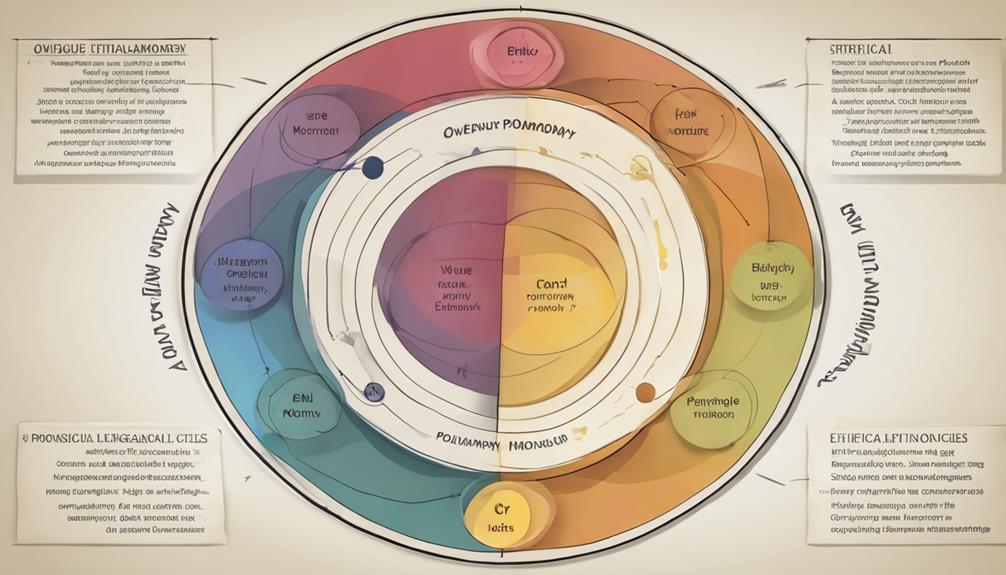According to a recent survey, about 4% of people in the United States have participated in a consensual non-monogamous relationship.
The concept of ethical non-monogamy challenges traditional views on love and commitment, offering a unique perspective on modern relationships. Exploring the nuances of ethical non-monogamy can shed light on the complexities of human connections and provide insight into alternative ways of navigating intimacy and partnership.
Understanding the ethical non-monogamy definition allows us to broaden our understanding of relational dynamics and interpersonal ethics, leading to intriguing discussions on the diverse ways people approach love and connection.
Key Takeaways
- Ethical non-monogamy involves consensual relationships with multiple partners based on communication and respect.
- It prioritizes honesty, transparency, and respect for individual needs to build strong emotional connections.
- ENM challenges traditional monogamous views by promoting understanding, intimacy, and personal growth.
- Choosing ENM allows for diverse exploration, authentic connections, and enriching experiences not limited to monogamous setups.
Understanding Ethical Non-Monogamy
When exploring the concept of ethical non-monogamy, it's essential to approach it with an open mind and a willingness to understand the complexities of this relationship style.
Ethical non-monogamy, often abbreviated as ENM, allows people to engage in consensual romantic and sexual relationships with multiple partners. In these types of relationships, communication and consent are paramount, setting a solid foundation for all individuals involved.
ENM challenges the traditional views of monogamy by emphasizing the importance of honesty and transparency in all interactions. People in ethical non-monogamous relationships prioritize emotional connections and feelings, creating a space where each partner's needs and desires are acknowledged and respected. This fosters a sense of understanding and intimacy that may differ from what's typically seen in monogamous relationships.
Key Principles of ENM

Engaging in ethical non-monogamy involves embracing key principles such as honesty, open communication, respect for boundaries, and mutual agreement. These principles form the foundation for healthy and fulfilling relationships within the realm of ENM. Transparency is essential in ENM, ensuring that all parties involved are fully aware and consenting to the dynamics at play. By upholding ethical behavior, which includes obtaining consent and showing respect, individuals in ENM can navigate complex relationship dynamics with mutual understanding.
| Principles | Description | Importance |
|---|---|---|
| Honesty | Being truthful and transparent | Builds trust |
| Open communication | Freely expressing thoughts and feelings | Prevents misunderstandings |
| Respect | Valuing each other's feelings and boundaries | Fosters mutual appreciation |
| Boundaries | Establishing and honoring personal limits | Ensures emotional safety |
| Mutual agreement | Reaching consensual decisions together | Strengthens relationship bonds |
Types of ENM Relationships
Building upon the foundational principles of honesty, open communication, respect, boundaries, and mutual agreement in ethical non-monogamy, various relationship dynamics exist within the realm of ENM, each offering unique expressions of love and connection.
In ethical non-monogamous relationships, partners can explore different types of relationships that suit their needs and desires. Polyamory, for instance, allows individuals to share love with multiple partners in a consensual manner, fostering deep emotional connections on various levels.
The Primary/Secondary model provides the opportunity for emotional commitment to a primary partner while engaging with other partners to fulfill different aspects of one's self.
Closed V arrangements involve one person romantically connected to two others who aren't romantically involved with each other, creating a dynamic that emphasizes unique connections within the group.
Throuple/Quad relationships consist of three or four individuals romantically involved with each other, forming intricate bonds that celebrate love in diverse ways.
Additionally, monogamish relationships occasionally involve other partners for sexual needs while maintaining a primarily monogamous dynamic, showcasing the flexibility and openness present in ENM relationships.
Practice exploring these types of ENM relationships can lead to fulfilling and consensually engaging connections that cater to the varying needs and desires of all partners involved.
Benefits of Choosing ENM

Choosing ethical non-monogamy offers individuals the opportunity to explore diverse physical, emotional, and spiritual needs within the boundaries of mutual agreement and consent. In embracing ENM, one can delve into the depths of their sexuality, forming connections with multiple partners that cater to various aspects of their being.
This freedom to seek different relationships outside the primary one can lead to a more balanced dynamic where no single partner is burdened with fulfilling all needs. By engaging in ENM, individuals can experience a range of fulfilling relationships that may not be achievable in a monogamous setup.
The consent-driven nature of ethical non-monogamy ensures that all parties involved are on the same page, fostering an environment where exploration and growth can flourish. ENM allows for a deeper understanding of oneself and others, ultimately paving the way for authentic connections and enriching experiences.
Practical Tips for ENM Practitioners
In navigating ethical non-monogamous relationships, setting clear boundaries and maintaining open communication with all partners is essential for fostering understanding and respect. By establishing rules and openly discussing expectations, practitioners can create a framework that promotes mutual understanding and respect in their relationships. Here are some practical tips for ENM practitioners:
| Tips | Description |
|---|---|
| Communicate openly | Regularly express feelings and concerns to maintain transparency and address issues promptly. |
| Seek guidance from experienced practitioners | Learn from those with ENM experience to navigate challenges and gain valuable insights. |
| Negotiate respectfully | Find a middle ground that honors the needs and desires of all partners involved, fostering a healthy relationship dynamic. |
Frequently Asked Questions
What Does It Mean to Be Ethically Non-Monogamous?
Being ethically non-monogamous means embracing multiple relationships with honesty, consent, and respect for everyone involved. It's about open communication, setting boundaries, and continually checking in with partners to ensure their feelings and needs are valued.
In this lifestyle, we prioritize mutual understanding and agreement while avoiding coercion or deception. It's all about fostering genuine connections and creating a space where everyone's well-being is at the forefront.
What Is Ethical Non-Monogamy for Dummies?
Ethical non-monogamy can seem overwhelming at first, but it's all about embracing love and connection in a way that suits everyone involved.
It means honoring each other's desires and boundaries, fostering trust through open communication, and cherishing the unique bonds we create.
By navigating this journey with empathy and respect, we can cultivate deep, meaningful relationships that enrich our lives.
Let's explore this path together and discover the beauty of ethical non-monogamy.
Is ENM and Poly the Same?
Yes, ENM and polyamory aren't exactly the same. While polyamory involves engaging in multiple romantic relationships with everyone's consent, ENM is a broader term covering various consensual non-monogamous relationship styles.
ENM can include open relationships, monogamish setups, and other ethical non-monogamous structures. Understanding these distinctions helps us appreciate the diversity of relationship options within the realm of ethical non-monogamy.
Is Cheating the Same as Non-Monogamy?
Cheating and non-monogamy hold distinct differences. Cheating breaches trust without consent; non-monogamy thrives on respect and honesty. Our relationships are built on openness and transparency. Consent, communication, and mutual agreement shape our connections.
Cheating disregards ethics, while ethical non-monogamy operates within an ethical framework. In our world, ethical non-monogamy and cheating stand at opposite ends, guided by consent and respect in our relationships.
What Are the Ethical Guidelines for Non-Monogamous Relationships in Spanish?
Navigating the intricacies of multiple romantic partners demands a deep understanding of ethics in nonmonogamy in Spanish. Respeto mutuo, honestidad y comunicación clara son pilares fundamentales. Establecer y honrar los límites acordados colectivamente fomenta relaciones saludables, respetuosas y éticas dentro del paradigma no monógamo.
Conclusion
In conclusion, ethical non-monogamy is like a garden of diverse flowers, each one unique and beautiful in its own way. By embracing open communication, honesty, and respect, individuals can cultivate meaningful relationships with multiple partners.
The key principles and types of ENM relationships offer options for exploring love and intimacy in a consensual and fulfilling manner. Remember, navigating ENM requires understanding, patience, and a commitment to growth for all involved.
Embrace the journey with an open heart and an open mind.
Augustus is the visionary leader and Editor-in-Chief of Personality-Test.net. With an unwavering commitment to quality and authenticity, he oversees all content, ensuring it enlightens and empowers our audience. Augustus believes deeply in the transformative power of self-awareness and is dedicated to making Personality-Test.net a beacon for those on a journey to understand themselves better.










